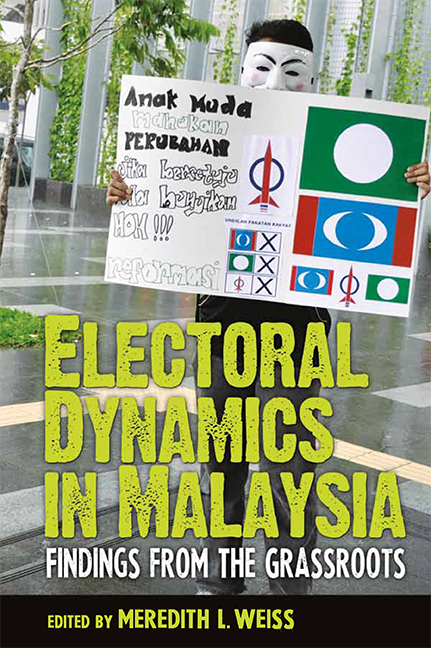Book contents
- Frontmatter
- Contents
- List of Tables
- Foreword
- Acknowledgements
- Glossary & Acronyms
- Chapter 1 Introduction: Patterns and Puzzles in Malaysian Electoral Dynamics
- Chapter 2 Arau, Perlis: The Irresistible Charm of Warlords, Women and Rewards?
- Chapter 3 Padang Serai, Kedah: Between the ‘Personal Touch’ and the Generous Hand
- Chapter 4 Kuala Nerus, Terengganu: New Malay Politics?
- Chapter 5 Balik Pulau, Penang: Home Run for the Home Boys
- Chapter 6 Lumut, Perak: Patronage, Clientelism and the Post-Coup Order
- Chapter 7 Kuantan, Pahang: Revealing the Ordinary
- Chapter 8 Pandan, Selangor: New Electoral Dynamics in Urban Malaysia
- Chapter 9 Kepong and Titiwangsa, Kuala Lumpur: Messages or Money?
- Chapter 10 Rembau, Negeri Sembilan: Personalities and Promises
- Chapter 11 Pulai, Johor: A Tale of Two Coalitions
- Chapter 12 Gelang Patah, Johor: Did Lim Kit Siang Truly Win His Last Gamble?
- Chapter 13 Kota Marudu and Keningau, Sabah: Personality, Patronage and Parochial Politics
- Chapter 14 Tuaran, Sabah: Party Loyalty and Rational Voting
- Chapter 15 Kota Kinabalu, Sabah: BN Loses Its ‘Fixed Deposit’
- Chapter 16 Beaufort, Sabah: Whither Lajim's Popularity?
- Chapter 17 Sibu and Lanang, Sarawak: Defeat of the Bosses
- Contributors
Chapter 10 - Rembau, Negeri Sembilan: Personalities and Promises
Published online by Cambridge University Press: 10 November 2017
- Frontmatter
- Contents
- List of Tables
- Foreword
- Acknowledgements
- Glossary & Acronyms
- Chapter 1 Introduction: Patterns and Puzzles in Malaysian Electoral Dynamics
- Chapter 2 Arau, Perlis: The Irresistible Charm of Warlords, Women and Rewards?
- Chapter 3 Padang Serai, Kedah: Between the ‘Personal Touch’ and the Generous Hand
- Chapter 4 Kuala Nerus, Terengganu: New Malay Politics?
- Chapter 5 Balik Pulau, Penang: Home Run for the Home Boys
- Chapter 6 Lumut, Perak: Patronage, Clientelism and the Post-Coup Order
- Chapter 7 Kuantan, Pahang: Revealing the Ordinary
- Chapter 8 Pandan, Selangor: New Electoral Dynamics in Urban Malaysia
- Chapter 9 Kepong and Titiwangsa, Kuala Lumpur: Messages or Money?
- Chapter 10 Rembau, Negeri Sembilan: Personalities and Promises
- Chapter 11 Pulai, Johor: A Tale of Two Coalitions
- Chapter 12 Gelang Patah, Johor: Did Lim Kit Siang Truly Win His Last Gamble?
- Chapter 13 Kota Marudu and Keningau, Sabah: Personality, Patronage and Parochial Politics
- Chapter 14 Tuaran, Sabah: Party Loyalty and Rational Voting
- Chapter 15 Kota Kinabalu, Sabah: BN Loses Its ‘Fixed Deposit’
- Chapter 16 Beaufort, Sabah: Whither Lajim's Popularity?
- Chapter 17 Sibu and Lanang, Sarawak: Defeat of the Bosses
- Contributors
Summary
Located in the state of Negeri Sembilan, Rembau consists of seventeen subdistricts (mukim) and 204 villages (kampung). Most Rembau residents work as farmers, government employees or industrial workers (Rembau District Council 2013). The majority of voters in Rembau are rural Malays, followed by Indian and Chinese voters.
Rembau has one parliamentary seat and four state seats: Paroi, Chembong, Rantau and Kota. In the 2008 12th general election (GE12), Barisan Nasional (BN) won the parliamentary seat and the Chembong, Rantau and Kota state seats against opponents from the People's Justice Party (PKR) and Pan-Malaysian Islamic Party (PAS), which have now joined with the Democratic Action Party (DAP) in Pakatan Rakyat (Pakatan). Losing Paroi in the 2008 election came as a surprise for the BN as the coalition has always considered Rembau as their solid base and voters there as strongly loyal. Hence, the BN was determined to win back the Paroi seat, and retain the others in Rembau, in the 13th general election (GE13) in 2013. The coalition succeeded in that goal. Both sides' campaign strategies in Rembau in GE13 illustrate the advantages that the BN has over Pakatan in terms of candidates' incumbency and, hence, claims to experience, but especially the particular benefit of efficient political machinery and a developmentalist focus.
Progress of the campaign
The BN campaign
All the BN's candidates in GE13 were from UMNO and four out of five were incumbents defending the seats they had won in GE12. A distinguishing feature of the BN's campaign here was the extent to which the campaign as a whole centred around the district's two most prominent candidates, Khairy Jamaluddin Abu Bakar, who was seeking his second term in the Rembau parliamentary seat, and Mohamad Hasan, the incumbent Chief Minister of Negeri Sembilan, who was defending his state seat in Rantau.
- Type
- Chapter
- Information
- Electoral Dynamics in MalaysiaFindings from the Grassroots, pp. 139 - 152Publisher: ISEAS–Yusof Ishak InstitutePrint publication year: 2013

